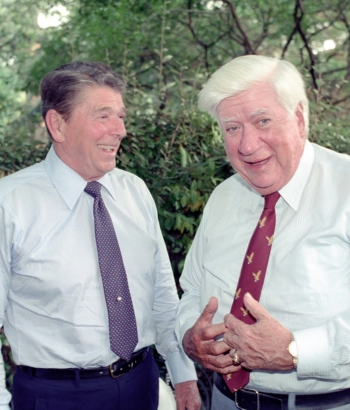Much has been written about the friendship—both political and personal—between Ronald Reagan and Tip O’Neill during the 1980s. This friendship, between the president and one of his rivals, shows a relationship of deep trust across difference.
Ronald Wilson Reagan, the 40th president of the United States, and Thomas Phillip “Tip” O’Neill, Jr. (Boston College ’36), Speaker of the House of Representatives from 1977 to 1987, were two political opposites. While much of their political partnership was based on smart gamesmanship, Reagan, the Republican, and O’Neill, the Democrat, could put aside their party differences to find solutions. They had mutual respect for each other that separated their ideological bent from the need for basic human decency. Reportedly, the two political rivals were good friends who frequently enjoyed a drink together at the end of the day.
A FRIENDSHIP OF MUTUAL RESPECT
In his book Tip and the Gipper: When Politics Worked, MSNBC talk show host and author Chris Matthews describes a scene that exemplifies the close relationship between Reagan and O’Neill.
Following the assassination attempt, former Reagan aide Max Friedersdorf shared that O’Neill was one of the first people the president let visit him at George Washington University Hospital. Friedersdorf observed that when O’Neill entered Reagan’s hospital room, “he nodded my way and walked over to the bed and grasped both the president’s hands, and said, ‘God bless you, Mr. President.’ The president still seemed groggy...with lots of tubes and needles running in and out of his body. But when he saw Tip, he lit up and gave the speaker a big smile, and said, ‘Thanks for coming, Tip.’ Then, still holding one of the president’s hands, the speaker got down on his knees and said he would like to offer a prayer for the president, choosing the 23rd Psalm.” Then O’Neill kissed Reagan on the forehead.
Matthews says this kind of relationship is sorely lacking in today’s Washington. “There were rules in those days,” Matthews writes. “Tip would say, ‘I’ll cut a deal on Social Security if you let me focus on taxing the wealthier people.’ There was always a deal. It’s not that they always found common ground, it’s that they each got something out of every deal. …A lot of times it was just getting something from the other guy.”
Matthews, an aide to O’Neill at the time, said the heavily emphasized social component is overstated. However, a post on the website Respect + Rebellion says Reagan often answered O’Neill’s calls, “Tip, is it after 6 p.m.?” since he and O’Neill often fought during work hours. But after 6, these two enemies enjoyed each other’s company.
They disagreed often but still worked toward the common goal of making our country better.
WHAT'S UNIQUE ABOUT THEIR FRIENDSHIP?
Matthews explains that Reagan and O’Neill genuinely liked each other. The two also didn’t suspect the worst of each other. “Reagan was fond of Tip and completely believed that Tip wanted to help the little people. He just disagreed about how to do it.” Matthews continued, “Reagan was his party. Tip was his party. It wasn’t like [John] Boehner trying to deal with people who are a little different than him.” It was clear that each man truly represented their party in full.
To further validate their admiration for each other, the speaker’s son, Thomas P. O’Neill III (Boston College ’68), once wrote about the relationship between his father and the president:
“While neither man embraced the other's worldview, each respected the other’s right to hold it. Each respected the other as a man.” —Thomas P. O’Neill III, “Frenemies: a Story,” The New York Times
At a retirement party for O’Neill in 1986, Reagan said, “Mr. Speaker, I’m grateful you have permitted me in the past, and I hope in the future, that singular honor—the honor of calling you my friend.”
Regardless of their party affiliation, the friendship between Reagan and O’Neill seemed to work well. They disagreed often but still worked toward the common goal of making our country better.
Friendships built in faith can exemplify these qualities, prioritizing mutual respect. It includes prayer and support in tough decisions. It relies on each other’s strengths to fill in gaps and speak the truth whenever there’s a shortcoming. They celebrate a great friendship at the end of the day, and offer a model—especially when you have political or ideological differences.
Rich Gorecki is the writer of GodBuddies, a blog about man’s need for deeper, more authentic friendships, and is the author of the book Get Out of Your Man Cave: The Crisis of Male Friendships.
This article excerpt was originally published February 28, 2022, on God-Buddies.com and is printed with permission. For more information, contact the author: Rich@God-Buddy.com.



